
Pay Our Mothers, the Producers of Quality Citizens
November 17th, 2014
What would happen if all the mothers in Jamaica went on strike? Now, there’s a thought.
The country would grind to a halt, I suspect. Children would not go to school. Families would go hungry. Economic production would slow. Households would cease to function. Clothes would go unwashed. We would all end up living in squalor and chaos.
Then why don’t we pay our mothers for the work they do?
At a “Meeting of the Minds” of the 51% Coalition (Women in Partnership for Development and Empowerment) funded by the Friedrich Ebert Stiftung in Kingston last week, women’s activist Joan French brought us right down to earth. Her discussion was on “Women and the Care Economy” – with a specific focus on “mothering work.” This meeting came out of a September 30 forum – a collaborative effort of the 51% Coalition with the Jamaican Government and the International Monetary Fund (IMF) on “Women, Work and the Economy: Macroeconomic Gains from Gender Equity.” Ms. French boiled it down to “The IMF, the Macro-Economy and Household Production and Reproduction, OR Pay Our Mothers.” While the IMF might call the care economy a “social” sector, separating it from the economy, French begs to differ. The work women do at home – caring – has economic value, indeed.
Mothers in Jamaican society are far more than “reproductive” – they are actual producers, who play an important role in the economy. And yet, they are not recognized as such. They don’t get paid one cent! Moreover, it is not only mothers who do the mothering, we know: how many Jamaicans were brought up by their grandmothers or aunts? Some single men play this role, too, we must not forget. 46% of households are headed by women (55% in Kingston) – but only 26% have a partner playing a supportive role. Care work is very much broader than mothering. And it is work! The problem is, though, that the history of union organizations shows a bias towards waged labor – only. Interestingly, before 1938 the concept of unions was actually much broader (did you know that?)
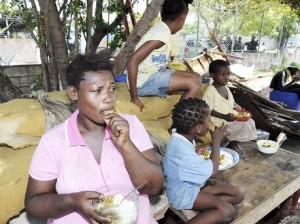
Novia Beckford sits on her bed having a meal with three of her children after their house was demolished on Duke Street in August 2012. (Photo: Norman Grindley/Gleaner)
French gave us several mental “jolts,” along the way. “Mothers are blamed for almost everything,” she declared. Well, isn’t this true? If a child goes missing, blame the mother. In cases such as the recent tragedy of seven-year-old Kedesha Cousins, walking home from school alone – blame the mother. The mother is often the convenient scapegoat (what about the community?) There is much finger-pointing at poor women, said French, and little empathy. For a start, the common criticism is that they “breed up too much.” Too many children in the first place. But please note: The current birth rate is actually an average of 2.3 per woman and it has been steadily declining for the past two or three decades.
It was carefully broken down for us. A combination of factors, stresses and challenges in the everyday life of a poor mother means that she can actually only do paid work between the hours of, say 10 a.m. and 2 p.m. Think about it. There are very real obstacles for a female head of household who wants to earn money to support herself and her family. Most lack the training for higher-paid jobs, and often end up in the informal economy, where there is more flexibility. But the informal economy is getting over-crowded. There are so many vendors on the streets, aren’t there, and many of them seem to be doing little business. I feel sad when I see a woman sitting all day on the street, with a small tray of items that are not selling.
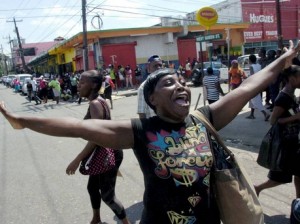
A vendor expresses anger at the actions of the security forces who demolished stalls and confiscated goods on West Queen Street, downtown Kingston. (Photo: Norman Grindley/Gleaner)
The availability of water is another growing (and pressing) issue for mothers, and not only in rural areas. Some inner-city areas go for weeks, even months without piped water. The truck runs out half way down the road; the hose breaks; someone pays them extra for more water. A mother’s working conditions are, sometimes literally, an uphill struggle (let’s not forget access to electricity, too).
French recently conducted a case study of one family: a mother aged 35, with two children aged eight and thirteen. We saw copies of their grocery bills – a minimum of J$5,000 per week. It was the bare essentials. Of course there are many other expenses, as we know, besides food. Children under twelve years can obtain free medical care, but after that full costs must be paid.
The problem is – the numbers don’t add up. The dollars just cannot stretch that far. Parents cannot save for back-to-school costs. They cannot save, period. Even if the mother obtains work as a domestic helper, she can barely meet her household expenses on the minimum wage, which is J$5,500 per week. Many try to get “day’s work” for which the standard rate is J$3,500 per day; but it is not easy to come by. Many employers pay less than this, and expect their helpers to work long hours – which of course, creates problems at home, too. Then there are bus fares, and lunch, the children’s school costs, and so on.
The only help that poor mothers get is from the Government’s Programme of Advancement Through Health and Education (PATH). It’s an income transfer programme,the only direct government help families receive. PATH has been touted in international fora as a tremendous social “safety net” program that supports education, healthcare and nutrition (through the school feeding program). “Women are grateful for it,” French said. But when she pointed out the benefits to us – J$825 every two months for boys in Grades 1 – 6, for example and J$750 for girls – there was a slightly stunned silence as the numbers sank in. And there are numerous conditions attached – reporting requirements, minimum school attendance records, health visits and so on – in order for families to continue receiving benefits. Meanwhile, the children live on dry crackers and “bag juice.”
Do we expect the IMF to care about any of this? No, it is not their priority at all. Their eyes are turned elsewhere. So what to do? French is suggesting a study or series of studies (some have been done in St. Vincent and Dominica) involving participant observation, of low-income mothers – in our cities, our towns, our rural districts – who are challenged in their efforts to raise our “quality citizens.” There is pitifully little data, I understand. And to actually some value to this unpaid work, in some way. So this is essential – and, I would say urgent.
So are we surprised at the loss of hope in many communities? “Poor women have no defenders,” French asserted.“The statistics are actually manipulated against women…They have virtually disappeared from the workforce.” She added wryly, “Although the ‘patriarchy’ is quick to demonstrate that ‘women are doing fine.'” French spoke eloquently of the vulnerability of the Jamaican child in these deprived circumstances. Children’s basic needs must be filled. It is harmful – even dangerous – for them to drift along without any basic structure to their lives. We have all seen what French described as the “fear between the eyes” of Jamaican children. They often don’t know what’s going to happen next, from day to day. For those of us who grew up in the comforting routine of a stable childhood (which we likely took for granted) – can you imagine this?
This knowledge, this certainty of “belonging” – of community responsibility for the child – is fundamental. French said she encountered something like this – a kind of community nurturing – in impoverished neighborhoods in the Comoros (an island archipelago in the Indian Ocean) while working with UNICEF. We wish we could find it in Jamaica. It’s possible, this collective caring.
Yes, that word: “caring.” And another word: “belonging.” These are not economic terms, of course. But without them, where is the glue to hold us together? How is our society sustainable?
Let’s value our mothers. Let’s pay our mothers!
Footnote: The women of Iceland have been on strike no less than four times in recent history, beginning in 1975. According to the World Economic Forum’s Global Gender Gap Rankings, Iceland has repeatedly ranked #1 in the world for gender equality in economics, education, health, and politics and has been called “the most feminist place in the world.”
Tags: 51% Coalition, birth rate, children's rights, Friedrich Ebert Stiftung, gender equity, Iceland, IMF, International Monetary Fund, Joan French, mothers, PATH, poverty, WMW Jamaica
The Gleaner reserves the right not to publish comments that may be deemed libelous, derogatory or indecent.
To respond to The Gleaner please use the feedback form.
3 Responses to “Pay Our Mothers, the Producers of Quality Citizens”
- We Are the Zoomers
- Living Online with Humans and Birds: NAOC 2020
- Human Trafficking and the Problem of Public Education
- Down Memory Lane
- Are We Ready to Recover from COVID-19?
- Road Safety Matters: Is Your Vehicle Safe?
- Sexual Harassment, Me Too, and the Minister’s Disturbing Giggle
- The Vulnerable Senior Citizens, Private Care Homes and COVID-19
- A Muddle Over Masks
- Here is Something Life-Saving You Can Do: Give Blood!

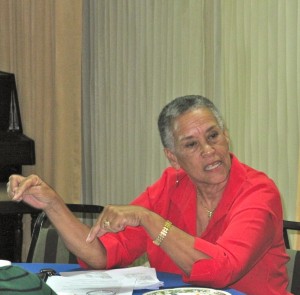
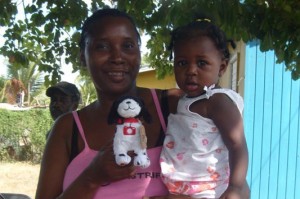
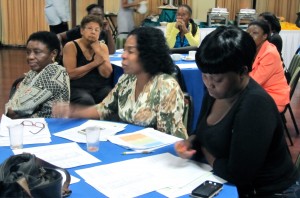


[…] “Pay Our Mothers, The Producers of Quality Citizens.” You can read it here: http://gleanerblogs.com/socialimpact/?p=2343 Thanks and kudos again to the 51% Coalition and Friedrich Ebert Stiftung for a stimulating and […]
Excellent work Emma. Thanks for this report. Let’s keep the fact that mothering is work too, and I would assert the most important work among them all, in the minds of all our people. I will share this widely.
Thanks so much, Dawn! I really appreciate your sharing and yes, mothering (whether it’s the biological mother or not) is “real” work.